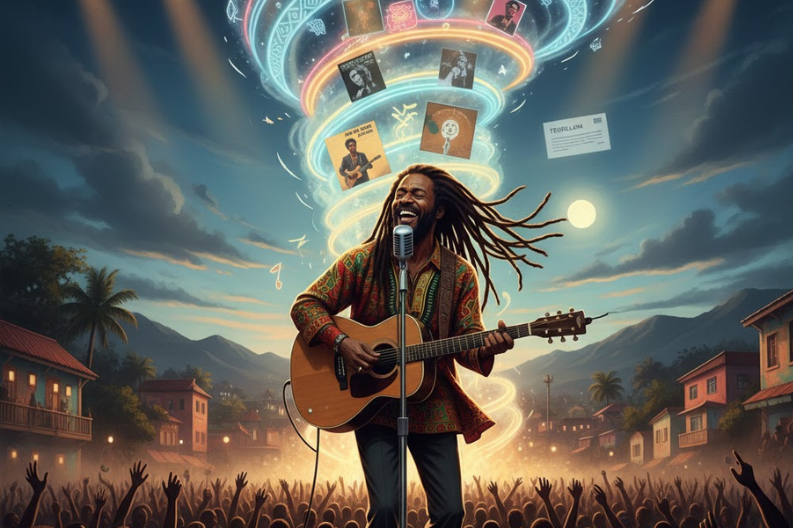Reggae legend Jimmy Cliff dies at age 81, leaving behind a monumental legacy that helped spread Jamaican music to the world. His wife, Latifa Chambers, announced on Monday that he passed away due to a seizure followed by pneumonia. The announcement came through his official Instagram account, bringing sadness to millions of fans worldwide.
Cliff was a charismatic reggae pioneer and actor who preached joy, defiance, and resilience through classics like Many Rivers to Cross, You Can Get It If You Really Want, and Vietnam. Furthermore, his smooth voice and powerful lyrics connected deeply with audiences across generations and continents.
Born James Chambers on July 30, 1944, during a hurricane in St James Parish in northwestern Jamaica, his early life mirrored the struggles he later sang about. Additionally, the hurricane destroyed his family’s home during his birth. He grew up as the second-youngest of eight children in abject poverty.
Nevertheless, young Jimmy displayed remarkable musical talent from an early age. He began singing in his local church at just six years old. Moreover, he wrote his first songs after hearing ska pioneer Derrick Morgan on the radio.
In the 1950s, Cliff moved with his father from their family farm to Kingston, determined to succeed in the music industry. At 14, he became nationally famous for the song Hurricane Hattie, which he wrote. Subsequently, he adopted the surname “Cliff” to express the heights he intended to reach.
In 1965, Chris Blackwell of Island Records invited Cliff to work in the United Kingdom with him. Initially, Island’s attempts to market him to rock audiences proved unsuccessful. However, Cliff persisted and eventually found his breakthrough.
By 1970, he had three singles in the UK charts: Wonderful World, Beautiful People, Vietnam, and a cover of Cat Stevens’ Wild World. Importantly, Bob Dylan called Cliff’s Vietnam the best protest song ever written. The song tells the story of a young soldier who promises his mother he’ll return home, only for her to receive a telegram announcing his death.
Cliff starred in the landmark 1972 movie The Harder They Come, playing Ivan Martin, a young man trying to break into Jamaica’s corrupt music industry. In the film, Martin eventually turns to crime when his music career stalls. Additionally, Cliff contributed four songs to the soundtrack, including the gospel hymn Many Rivers to Cross.
The film and its soundtrack became a cultural phenomenon. Indeed, it was instrumental in introducing reggae to an international audience. Moreover, the soundtrack is widely cited as among the greatest ever recorded.
Many Rivers to Cross reflected Cliff’s early struggles in England. He later recalled: “I came full of vigour, thinking I’d be up there with the Beatles and the Stones.” However, he faced racism and struggled to find his place. Consequently, frustration fueled the deeply emotional song.
In 2010, Cliff was inducted into the Rock and Roll Hall of Fame, which described him as reggae’s “first champion“. Furthermore, the Hall of Fame noted that Jimmy Cliff was instrumental in spreading reggae beyond Jamaica.
Throughout his career, Cliff collaborated with numerous international artists. Specifically, he worked with the Rolling Stones, Elvis Costello, Annie Lennox, and Paul Simon. Similarly, artists like Bruce Springsteen and Willie Nelson recorded versions of his songs.
In 2012, he won a Grammy Award for best reggae album for Rebirth, which was produced by punk band Rancid’s Tim Armstrong. Additionally, he won another Grammy in 1984 for Cliff Hanger. Moreover, he released his final album, Refugees, in 2022.
Cliff’s animated onstage presence and high-pitched tone were unmistakable. He continued performing late into his life, playing Glastonbury’s legends slot in 2003 and winning over new generations at the 2010 Coachella Festival.
Jamaican Prime Minister Andrew Holness called Cliff “a true cultural giant whose music carried the heart of our nation to the world”. Furthermore, he added: “His music lifted people through hard times, inspired generations, and helped shape the global respect that Jamaican culture enjoys today.”
On March 28, 2019, Gloucester Avenue in Montego Bay was officially renamed Jimmy Cliff Boulevard in his honor. This recognition highlighted the deep respect Jamaica held for its native son.
When Wyclef Jean inducted Cliff into the Rock Hall in 2010, he said: “When we saw Jimmy Cliff, we saw ourselves.” Indeed, Cliff represented hope for people from rural areas and ghettos worldwide.
Cliff once reflected on his greatest satisfaction: “When someone says my song made them go back to school. And now they’re a teacher using my song with students, that, for me, is a big success.”
Reggae legend Jimmy Cliff dies, but his music of hope, resilience, and defiance will continue inspiring generations. And carrying Jamaica’s heart to every corner of the world for years to come.



